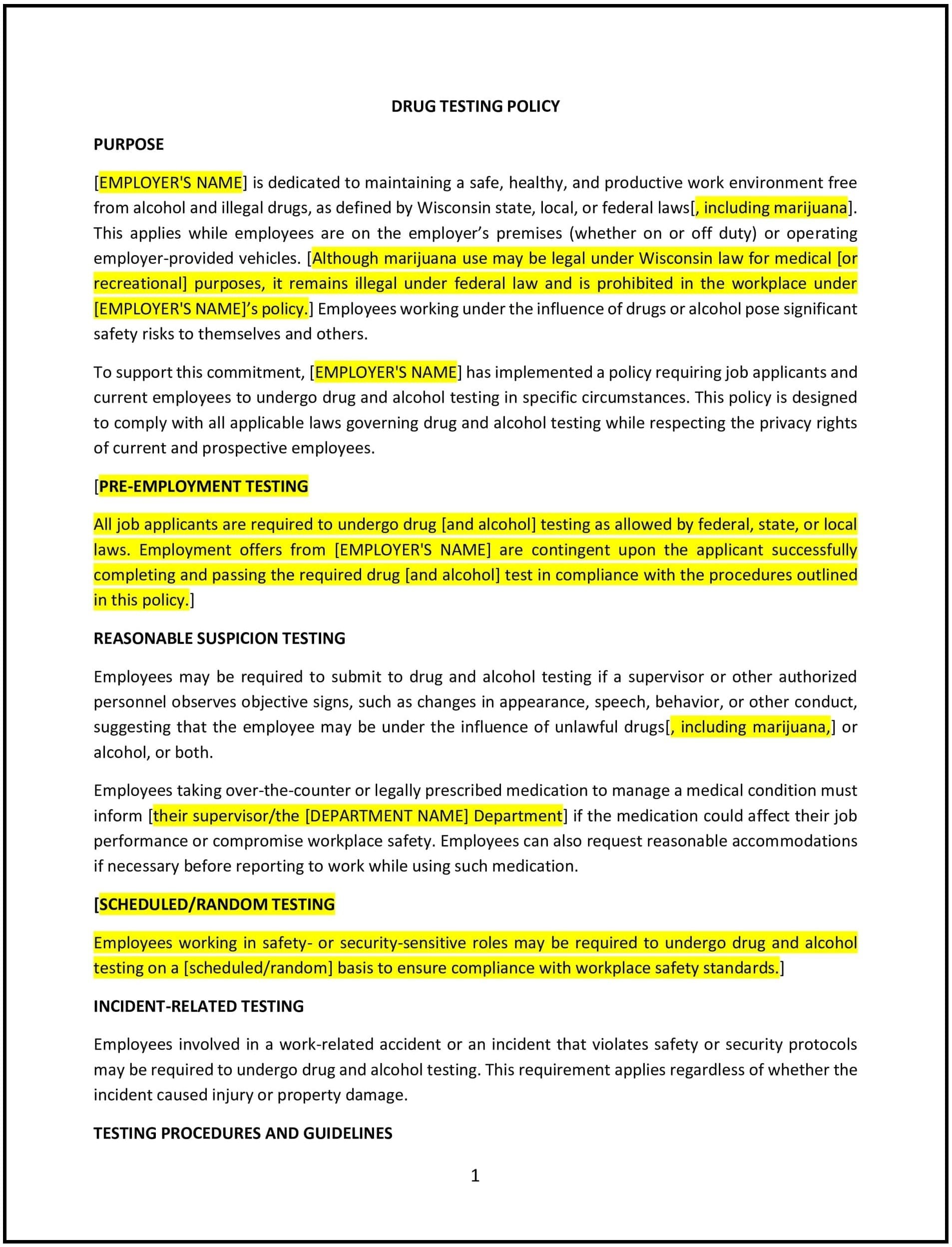Got contracts to review? While you're here for policies, let Cobrief make contract review effortless—start your free review now.

Customize this template for free
Drug testing policy (Wisconsin)
A drug testing policy helps Wisconsin businesses maintain a safe and productive work environment by outlining the company's procedures for conducting drug tests. This policy promotes compliance with state and federal laws and provides clear guidelines for employees regarding prohibited substances, testing procedures, and the consequences of drug-related violations.
By implementing this policy, businesses can promote workplace safety, reduce the risk of accidents, and create a healthier, more efficient workforce.
How to use this drug testing policy (Wisconsin)
- Define the scope of testing: Clearly outline the situations in which drug testing will occur, such as pre-employment testing, random drug testing, post-accident testing, or when there is reasonable suspicion of drug use.
- Specify prohibited substances: List the substances that are prohibited by the company, including illegal drugs, prescription medications that impair job performance, alcohol, and any other substances that may affect an employee’s ability to perform their duties safely and effectively.
- Detail the testing process: Explain the procedures for drug testing, including how tests will be administered (e.g., urine, saliva, hair), the process for notifying employees about testing, and when testing will occur (e.g., during business hours or after a workplace accident).
- Outline consequences for violations: Specify the disciplinary actions that may be taken if an employee tests positive for drugs or refuses to take a test. These actions could include suspension, termination, or mandatory participation in a rehabilitation program.
- Address confidentiality: Clarify how drug test results will be kept confidential and only shared with authorized personnel, ensuring that employees' privacy is respected.
- Promote compliance with state and federal laws: Make sure the policy aligns with Wisconsin state laws, as well as federal regulations regarding drug testing in the workplace, particularly for industries with specific testing requirements.
- Provide guidance on accommodation: If applicable, outline how the company will handle situations where an employee is taking prescription medications that may affect their ability to pass a drug test, including possible accommodations.
- Set a policy review schedule: Periodically review the drug testing policy to ensure that it improves compliance with updated laws, regulations, and company practices.
Benefits of using this drug testing policy (Wisconsin)
This policy offers several benefits for Wisconsin businesses:
- Promotes workplace safety: Drug testing helps reduce the risk of workplace accidents, injuries, or fatalities by ensuring that employees are fit to perform their job duties and are not impaired by drugs or alcohol.
- Reduces legal risks: A clear drug testing policy improves compliance with Wisconsin state laws and federal regulations, reducing the risk of legal disputes related to drug use and testing.
- Enhances employee productivity: Employees who are free from drug impairment are more likely to be focused, productive, and efficient, leading to higher performance and job satisfaction.
- Protects company assets: Drug testing can prevent theft, misuse of company resources, or decreased productivity caused by substance abuse, protecting the company’s financial and operational interests.
- Fosters a healthy work environment: By discouraging drug use, the policy helps maintain a work environment where all employees can work safely and effectively, improving morale and collaboration.
Tips for using this drug testing policy (Wisconsin)
- Communicate the policy clearly: Ensure that all employees are aware of the drug testing policy from the start of their employment, especially during onboarding. Provide training and regular reminders about the importance of maintaining a drug-free workplace.
- Implement consistent procedures: Make sure that drug testing is administered consistently and fairly across the organization, with clear guidelines for how and when testing will occur.
- Use third-party testing services: Consider using a certified third-party provider to administer drug tests to ensure impartiality, accuracy, and compliance with state and federal regulations.
- Handle results with care: Be mindful of employee confidentiality and ensure that drug test results are securely stored and shared only with authorized personnel.
- Review the policy regularly: Regularly review the policy to ensure it complies with Wisconsin state laws and any changes to federal regulations or industry-specific requirements. Update the policy as necessary to maintain legal compliance and align with company goals.